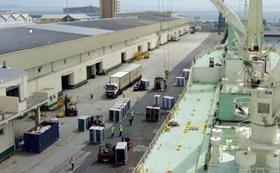
These days, it’s all about 360-degree visibility across the supply chain. Managers want to know precisely where products are at any given moment, what temperature they are being stored at or transported in, and how they can be as efficient as possible. And preferably all at the touch of a button on their tablet.
The world of supply chain technology is moving apace, and suppliers are forever looking for more efficiencies and cost reductions while maximising traceability. “This is something the traditional model of paper-based checks is simply unable to provide,” explains Richard Jones, chief technology officer at LinkFresh. “Therefore, Enterprise Resource Planning (ERP) software is stepping forward as the tool of the future for those in the food supply chain who wish to remain
competitive.”
Cloud-based ERP is having a particular impact, he adds, as it is especially useful for seasonal producers and large farming operations. “Another key benefit cloud-based ERP provides is the ability to access real-time supply chain information from mobile locations via a tablet or smartphone,” Jones continues. “Being able to do this means that suppliers can react promptly to developments in the supply chain – such as potential contaminations – pinpoint the problem and react quickly.”
ERP is also a major part of Prophet’s Pr3 management software, which is used by a number of major fresh produce suppliers dealing with complex supply chains that often involve products across many companies and modes of travel.
Traceability is similarly a key issue for Affinitus, whose Freshware system delivers wide-ranging real-time information visibility for growers and packers.
It’s not just computer systems where advances are being made in the sphere of product visibility, with a number of new innovations coming in the transport arena. This month, for instance, Locus Traxx Worldwide added new Go Lux real-time temperature and location technology that features a highly sensitive light sensor to detect unauthorised access to products during transit.
Go Lux offers access to global visibility for real-time monitoring of location, temperature and security, and features quick and simple installation and worldwide recyclable platforms, according to Locus Traxx.
Cold chain technology specialist Dearman, meanwhile, recently won funding from Innovate UK to develop a wider range of customised applications of its zero-emissions transport refrigeration system.
The grant supports the modelling, testing and validation of the firm’s liquid nitrogen-powered system, which is being touted as the industry’s “quick-fix” solution to air pollution. Among other benefits, the new funding will allow the system to be applied to a wider range of vehicles including servicing vehicles with multiple compartments requiring different temperatures, and retrofitting current vehicles.
Dearman’s liquid nitrogen system is currently undergoing on-vehicle trials, with the first commercial field trial set to take place later this year ahead of extended field trials in 2016.
Metagenomicsfor food safety
The need to prevent outbreaks of food-borne illness has been the focus of attention for software giant IBM, which has been running a large-scale experiment in conjunction with confectionery manufacturer Mars.
In the study, researchers are harvesting and sequencing the DNA and RNA of simple food samples to determine where anomalies and mutations occur when paired with common organisms or genes, toxins and heavy metals.
The outcome aims to be the creation of a “microbial baseline” or benchmark representing normal microbe communities, with the index described as being a “gold standard for food and health officials globally to understand what triggers contamination and the spread of disease”.
The project, which makes use of a bespoke informatics infrastructure developed in the IBM Accelerated Discovery Lab, aims to improve the statistic that one in six people in the US alone are affected by food-borne diseases each year.
Protecting fresh produce integrity
The Fresh Produce Consortium has set up a Produce Integrity Database aimed at reducing costs, avoiding duplication, benchmarking performance and giving users access to robust, confidential industry data.
The thinking behind the database was to enable members and suppliers to share and access knowledge of emerging issues relating to pesticides, microbial and environmental contaminants in a confidential manner.
The FPC developed the system in collaboration with Food Experts to allow participants to collate and analyse data in a private and secure environment.



